The Intel Comet Lake Core i9-10900K, i7-10700K, i5-10600K CPU Review: Skylake We Go Again
by Dr. Ian Cutress on May 20, 2020 9:00 AM EST- Posted in
- CPUs
- Intel
- Skylake
- 14nm
- Z490
- 10th Gen Core
- Comet Lake
CPU Performance: Web and Legacy Tests
While more the focus of low-end and small form factor systems, web-based benchmarks are notoriously difficult to standardize. Modern web browsers are frequently updated, with no recourse to disable those updates, and as such there is difficulty in keeping a common platform. The fast paced nature of browser development means that version numbers (and performance) can change from week to week. Despite this, web tests are often a good measure of user experience: a lot of what most office work is today revolves around web applications, particularly email and office apps, but also interfaces and development environments. Our web tests include some of the industry standard tests, as well as a few popular but older tests.
We have also included our legacy benchmarks in this section, representing a stack of older code for popular benchmarks.
All of our benchmark results can also be found in our benchmark engine, Bench.
Speedometer 2: JavaScript Frameworks
Our newest web test is Speedometer 2, which is a accrued test over a series of javascript frameworks to do three simple things: built a list, enable each item in the list, and remove the list. All the frameworks implement the same visual cues, but obviously apply them from different coding angles.
Our test goes through the list of frameworks, and produces a final score indicative of ‘rpm’, one of the benchmarks internal metrics. We report this final score.
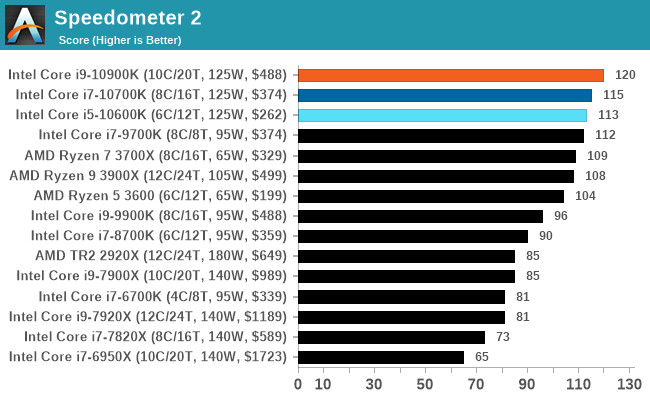
Google Octane 2.0: Core Web Compute
A popular web test for several years, but now no longer being updated, is Octane, developed by Google. Version 2.0 of the test performs the best part of two-dozen compute related tasks, such as regular expressions, cryptography, ray tracing, emulation, and Navier-Stokes physics calculations.
The test gives each sub-test a score and produces a geometric mean of the set as a final result. We run the full benchmark four times, and average the final results.
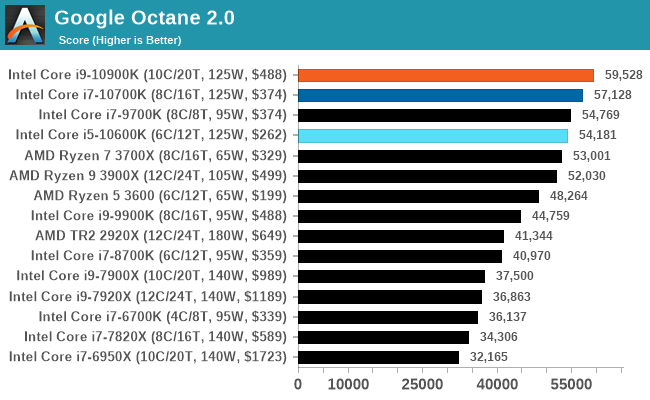
Mozilla Kraken 1.1: Core Web Compute
Even older than Octane is Kraken, this time developed by Mozilla. This is an older test that does similar computational mechanics, such as audio processing or image filtering. Kraken seems to produce a highly variable result depending on the browser version, as it is a test that is keenly optimized for.
The main benchmark runs through each of the sub-tests ten times and produces an average time to completion for each loop, given in milliseconds. We run the full benchmark four times and take an average of the time taken.
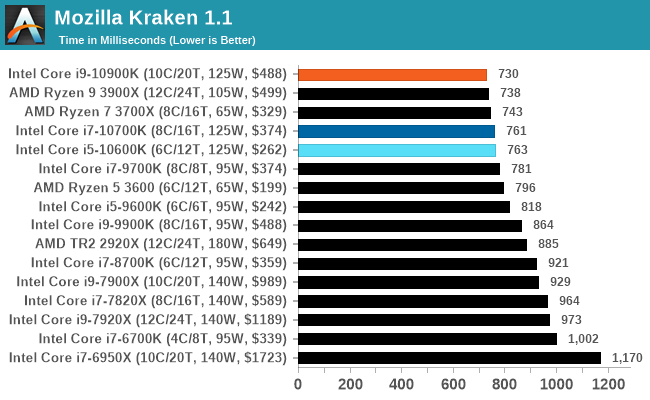
3DPM v1: Naïve Code Variant of 3DPM v2.1
The first legacy test in the suite is the first version of our 3DPM benchmark. This is the ultimate naïve version of the code, as if it was written by scientist with no knowledge of how computer hardware, compilers, or optimization works (which in fact, it was at the start). This represents a large body of scientific simulation out in the wild, where getting the answer is more important than it being fast (getting a result in 4 days is acceptable if it’s correct, rather than sending someone away for a year to learn to code and getting the result in 5 minutes).
In this version, the only real optimization was in the compiler flags (-O2, -fp:fast), compiling it in release mode, and enabling OpenMP in the main compute loops. The loops were not configured for function size, and one of the key slowdowns is false sharing in the cache. It also has long dependency chains based on the random number generation, which leads to relatively poor performance on specific compute microarchitectures.
3DPM v1 can be downloaded with our 3DPM v2 code here: 3DPMv2.1.rar (13.0 MB)
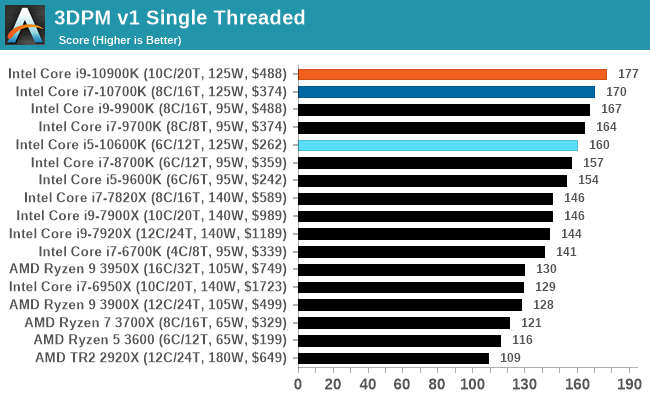
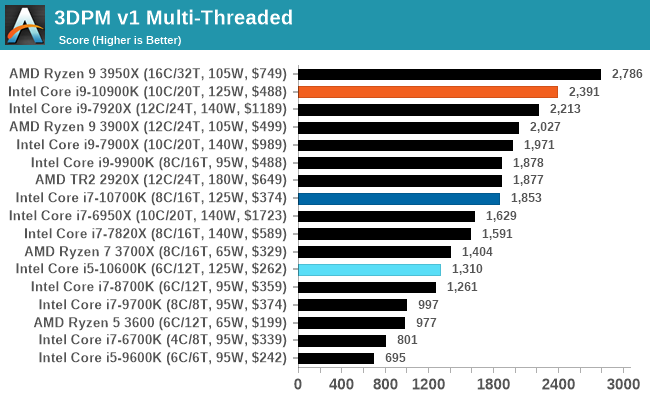
x264 HD 3.0: Older Transcode Test
This transcoding test is super old, and was used by Anand back in the day of Pentium 4 and Athlon II processors. Here a standardized 720p video is transcoded with a two-pass conversion, with the benchmark showing the frames-per-second of each pass. This benchmark is single-threaded, and between some micro-architectures we seem to actually hit an instructions-per-clock wall.
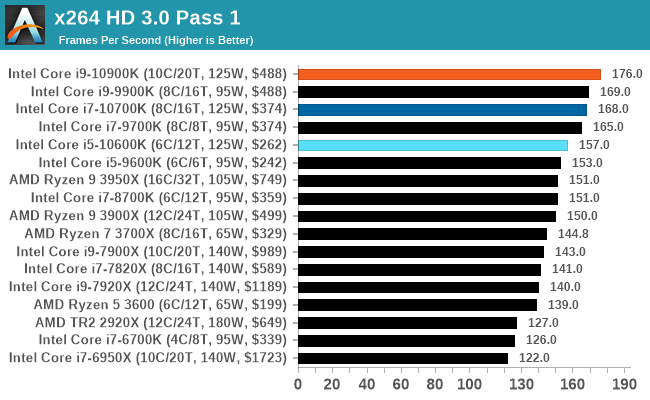
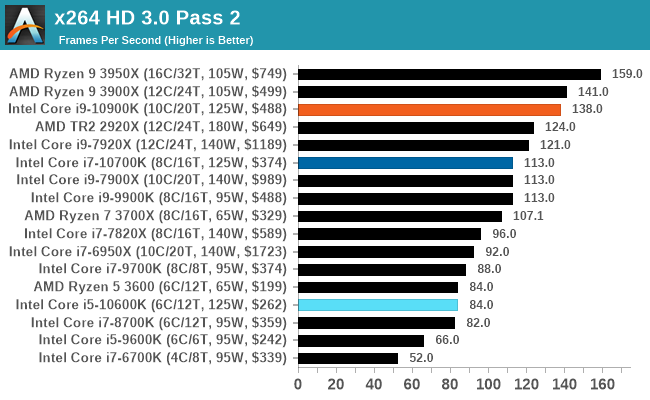










220 Comments
View All Comments
Gastec - Friday, May 22, 2020 - link
"pairing a high-end GPU with a mid-range CPU" should already be a meme, so many times I've seen it copy-pasted.dotjaz - Thursday, May 21, 2020 - link
What funny stuff are you smoking? In all actual configurations, AMD doesn't lose by any meaningful margin at a much better value.Anandtech is running CPU test where you set the quality low and get 150+fps or even 400+fps, nobody actually does that.
deepblue08 - Thursday, May 21, 2020 - link
Intel may not be a great value chip all around. But a 10 FPS lead in 1440p is a lead nevertheless: https://hexus.net/tech/reviews/cpu/141577-intel-co...DrKlahn - Thursday, May 21, 2020 - link
If that's worth the more expensive motherboard, beefier (and more costly) cooling, and increased heat then go for it. If you put 120fps next to 130fps without a counter up how many people could tell?Personally I don't see it as worth it at all. Nor do I consider it a dominating lead. But I'm sure there are people out there that will buy Intel for a negligible lead.Spunjji - Friday, May 22, 2020 - link
An entirely unnoticeable lead that you get by sacrificing any sort of power consumption / cooling sanity and spending measurably larger amounts of cash on the hardware to achieve the boost clocks required to get that lead.The difference was meaningful back when AMD had lower minimum framerates, less consistency and -30fps or so off the average. Now it's just silly.
babadivad - Thursday, May 21, 2020 - link
Do you need a new mother board with these? If so they make even less sense than they already did.MDD1963 - Friday, May 22, 2020 - link
As for Intel owners, I don't think too many 8700K, 9600K or above owners would seriously feel they are CPU limited and in a dire/ imminent need of a CPU upgrade as they sit now, anyway. Users of prior generations (I'm still on 7700K) will make their choices at a time of their own choosing, of course, and not simply because 'a new generation is out'. (I mean, look at 8700K vs. 10600K results.....; looks almost like a rebadging operation)khanikun - Wednesday, May 27, 2020 - link
I was on a 7700k and didn't feel CPU limited at all, but decided to get an 8086k for the 2 more cores and just cause it was an 8086. For my normal workloads or gaming, I don't notice a difference. I do reencode videos maybe a couple times a year. The only times I'll see the difference.I'll probably just be sitting on this 8086k for the next few years, unless something on my machine breaks or Intel does something crazy ridiculous, like making some 8 core i7 on 10nm at 5 ghz all core, in a new socket, then making dual socket consumer boards for it for relatively decent price. I'd upgrade for that, just cause I'd like to try making a dual processor system that isn't some expensive workstation/server system.
Spunjji - Friday, May 22, 2020 - link
Yes, you do. So no, they don't make sense xDGastec - Friday, May 22, 2020 - link
Games...framerate is pointless in video games, all that matters now are the "surprise mechanics".